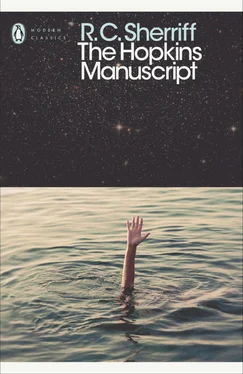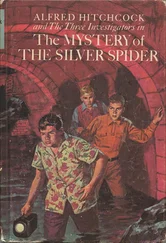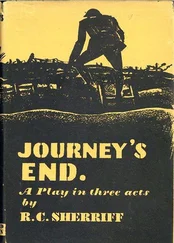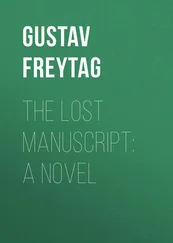Роберт Шеррифф - The Hopkins Manuscript
Здесь есть возможность читать онлайн «Роберт Шеррифф - The Hopkins Manuscript» весь текст электронной книги совершенно бесплатно (целиком полную версию без сокращений). В некоторых случаях можно слушать аудио, скачать через торрент в формате fb2 и присутствует краткое содержание. Год выпуска: 2018, ISBN: 2018, Издательство: Penguin Books, Жанр: sf_postapocalyptic, humor_satire, на английском языке. Описание произведения, (предисловие) а так же отзывы посетителей доступны на портале библиотеки ЛибКат.
- Название:The Hopkins Manuscript
- Автор:
- Издательство:Penguin Books
- Жанр:
- Год:2018
- ISBN:978-0-241-34908-3
- Рейтинг книги:4 / 5. Голосов: 1
-
Избранное:Добавить в избранное
- Отзывы:
-
Ваша оценка:
- 80
- 1
- 2
- 3
- 4
- 5
The Hopkins Manuscript: краткое содержание, описание и аннотация
Предлагаем к чтению аннотацию, описание, краткое содержание или предисловие (зависит от того, что написал сам автор книги «The Hopkins Manuscript»). Если вы не нашли необходимую информацию о книге — напишите в комментариях, мы постараемся отыскать её.
The Hopkins Manuscript — читать онлайн бесплатно полную книгу (весь текст) целиком
Ниже представлен текст книги, разбитый по страницам. Система сохранения места последней прочитанной страницы, позволяет с удобством читать онлайн бесплатно книгу «The Hopkins Manuscript», без необходимости каждый раз заново искать на чём Вы остановились. Поставьте закладку, и сможете в любой момент перейти на страницу, на которой закончили чтение.
Интервал:
Закладка:
Mr Barlow was grateful, and we stood for a few moments, chatting by the gate in the mellow light of the sunset.
‘Lovely evening, Barlow,’ I said (for I believe in being affable at all times with the honest folk of the village).
‘Lovely indeed, Mr Hopkins,’ replied Barlow. ‘Lovely sunset – but rusty again.’
Our heads turned towards the glow that fretted its way through the ancient beeches of The Manor House, and for a while we were both held in a strange silence.
‘Rusty again.’ It was the first time I had heard expressed in words the strangeness which I had felt towards eventide on several occasions in the past few weeks…
‘I never seed that rusty colour in all my life afore,’ added Barlow.
I nodded in silent agreement, but could not dismiss the phenomenon so easily as Barlow did, as a mere freak of nature. There was no difference in the actual appearance of the sun, nor in the shape of the little clouds that surrounded it as it sank gently behind the trees. But, as it passed, it left a great sombre tarnish in the sky – a feverish glow of poisoned blood that had no beauty in it – that oppressed and disturbed me.
The newspapers, so quick to note and record all oddities of nature, had apparently overlooked the phenomenon, nor had the village folk done more than pass a casual remark across the bar of the Fox & Hounds.
But my keenly developed astronomical eye had led me to an observation of this strange phenomenon more close than that of my neighbours. At first I had noted it with curiosity and scientific interest – and then, as it persisted, I was drawn each evening into my garden with an increasing sense of wonder and a growing disturbance of mind.
Upon one evening in particular I returned to my house with a genuine sense of fear. The sky, upon that night, was overcast, and the sun, since midday, had been lost to view. But as I watched the sky beyond the beeches I saw the same rusty glow appear – indistinct because it was swathed in cloud – and yet it seemed to pulsate behind its covering like some horrid, festered wound beneath a dirty yellow bandage.
I felt so uneasy that I sat down after dinner and wrote a letter to The Times. I registered the letter next morning, but I watched for its appearance in vain. And then for a little while the phenomenon had disappeared and the sun had set once more in its old, friendly gowns of gold and crimson. I had begun to believe that the strangeness had been, after all, a mere passing illusion: I had ceased to search the sky at evening – I had almost forgotten it – and now, here it was, ‘rusty again’, as old Barlow so aptly put it.
‘It disappeared three weeks ago,’ I said. ‘It’ll disappear again.’ I took my letters, bade the old man goodnight and closed my gate.
Halfway up my hillside path lay an arbour shaped from fine old yews. It was a favourite resting place of mine with a lovely view across the countryside, and upon clear days I could glimpse a silver strip of sea.
I paused at my arbour and sat down to read my mail. There were three letters that night. The first was an invoice for £18 12s 3d covering the new poultry houses I had recently purchased from Haggard & Jackson of Winchester. The second was an invitation card to the Annual Prizegiving and Latin Play at Portsea Grammar School – an invitation I always appreciated and frequently sacrificed important engagements to accept. The third contained the letter that ended my days of peace: happy days that have never since returned, and never will again.
Often, in the past seven dreadful years, I have looked back upon that evening: often I have lived again the last hour of happiness that I was ever to know upon this earth: that peaceful stroll to the village – my quiet chat with Mr Flidale, the carrier, in his cottage by the bridge – a moment’s pause to watch the boys at football on the green – the country sounds; the smell of the hay – the peaceful stroll home and chat with old Barlow at my gate; the last hour of my life – the last hour in which I was to know the meaning of repose…
I have that letter in my pocket-book today, worn and battered by the dreadful misfortunes that I and my personal belongings have suffered. I copy it down in its entirety: –
Secretary: Humphrey H Tugwall
76 Barbara Street,
WC1
18th September 1945
Sir,
I am instructed by the President and Committee to summon you to a special meeting of the British Lunar Society to be held at the Society’s headquarters on the 8th October at 6 pm.
As the subject of this meeting is of the most highly confidential nature, no guests will be permitted, and members are requested to keep both this notice and the matters announced at the meeting most secret and confidential.
Yours faithfully, Humphrey H. TugwallTwilight came, and I sat without moving with the letter in my hands. The invoice for the poultry houses, the invitation to the Prizegiving, fluttered to the ground, forgotten.
I felt suddenly cold and sick, for the thing that I had secretly dreaded for the past six months had apparently happened.
In the spring of that year Professor Hartley, our President (a brilliant astronomer and a charming man), had put before the members of the Society a bold proposal.
In his opinion, he said, the Society should not be content with a monthly meeting for reading papers and discussing lunar topics. The Society should possess its own observatory and its own telescope.
In a simple but masterly statement of finance he explained that a lease could be obtained of the roof of a tall radio factory upon high ground at Hampstead. The rental would be £90 a year: the cost of the observatory £800, and the price of the telescope, instruments, etc., £750: an outlay of £1,550 and a yearly rental.
Our existing inadequate premises cost £120 a year and subscriptions from our 109 members at two guineas was £230. We had a satisfactory balance of £194 in the bank, and as the observatory was certain to lead to a large increase in members we could confidently look forward to a higher revenue.
He explained a sinking fund to defray the cost of installation, and as I listened I was thrilled by the courage and enterprise of the scheme.
I shall never forget my growing anger as member after member rose to his feet to tear the scheme to pieces with ridicule, cowardice and spiteful criticism. Their sluggish little brains were content with what they had: their timid little minds dreaded the dangers of expansion. They didn’t want a telescope! Apparently they were content to read about the moon and listen to cleverer men than themselves lecture upon it. To study it for themselves would be too big a call upon their intelligence! They disguised their cowardice by enlarging upon the financial risks and predicting bankruptcy for the club.
Neither shall I forget the part I played upon that historic evening.
With a surge of white-hot anger I rose to my feet and spoke as I have never spoken before. By nature I am a quiet, retiring man, too prone to allow men with louder voices and lesser intelligence to have their way. But as I sat there watching our President’s brave, patient face as his carefully made plans were ridiculed and destroyed I became as a man beside himself.
In a loud, firm voice I accused my opponents of rank cowardice, narrow-mindedness and base disloyalty to our fine President. I dwelt vigorously upon the untold advantages of possessing our own telescope. ‘We call ourselves the British Lunar Society,’ I said, ‘and yet we do nothing but listen to strangers who tell us what we should see with our own eyes!’
Well do I remember the stupid, ironical laughter that became fuel to my ungovernable passion. Well do I remember the voice that shouted: ‘Who’s going to pay the bill if the scheme’s a failure?’
Читать дальшеИнтервал:
Закладка:
Похожие книги на «The Hopkins Manuscript»
Представляем Вашему вниманию похожие книги на «The Hopkins Manuscript» списком для выбора. Мы отобрали схожую по названию и смыслу литературу в надежде предоставить читателям больше вариантов отыскать новые, интересные, ещё непрочитанные произведения.
Обсуждение, отзывы о книге «The Hopkins Manuscript» и просто собственные мнения читателей. Оставьте ваши комментарии, напишите, что Вы думаете о произведении, его смысле или главных героях. Укажите что конкретно понравилось, а что нет, и почему Вы так считаете.












